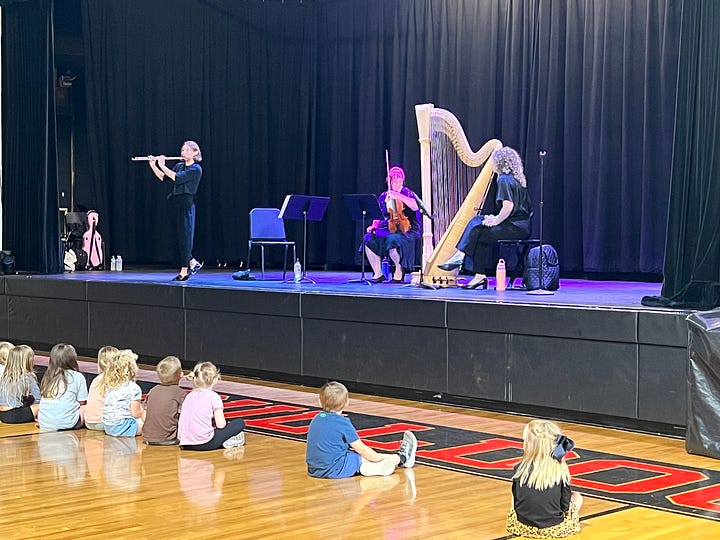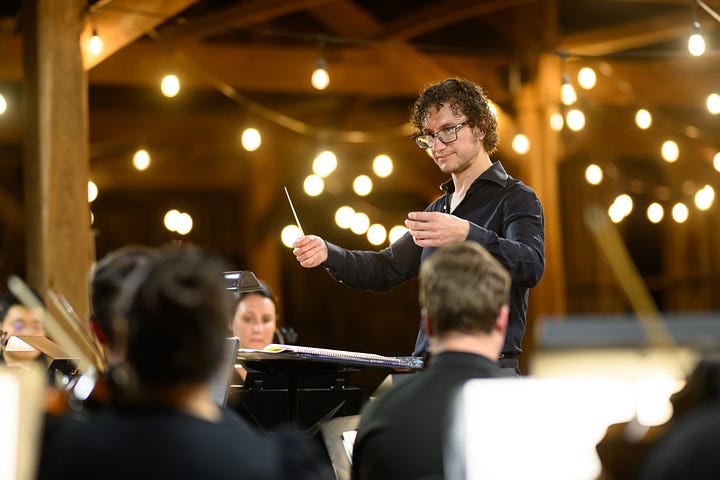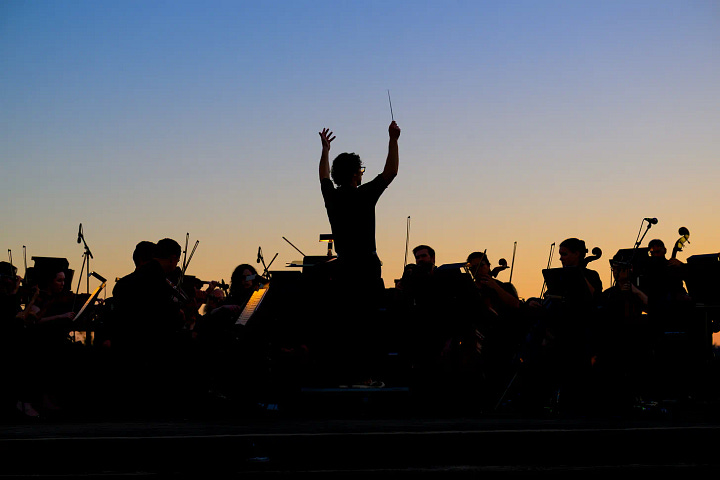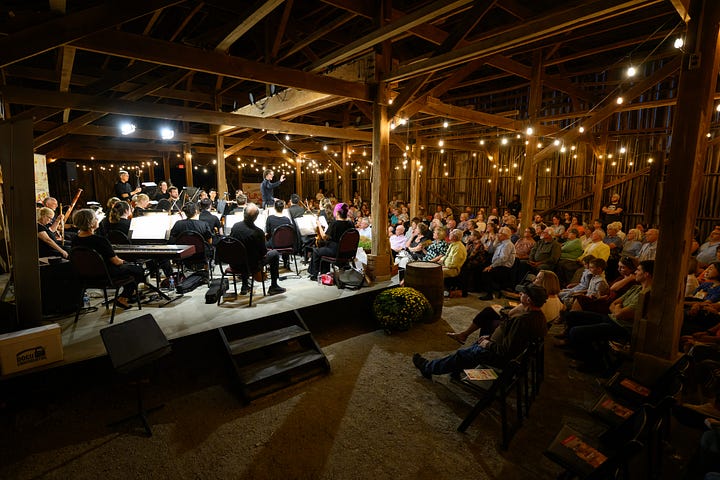Can Music Help Bridge America's Divide?
In a time of extreme division, The Louisville Orchestra forges some common ground in Kentucky—and points a way forward for our embattled nation
Author’s Note: This is the latest installment of America, Wherefore Art Thou?, which focuses on culture and society and aims to find some light amid these dark and troubling times. This story draws on several days of reporting last month in Kentucky after an inspiring conversation with Teddy Abrams, the conductor of the Louisville Orchestra, at the Aspen Ideas Festival in June. That was where he told me about what he was doing in Kentucky—an intriguing state solution to a national problem—after which I decided I had to go and see for myself. (Read to the end of the story to hear samples of the music.)
Louisville Orchestra conductor Teddy Abrams gazes out at the crowd of nearly a thousand people who have gathered on a hill in the Appalachian Mountains of Eastern Kentucky. Many are residents of Beattyville (population 2,125), while others have come from across Lee County (population 7,313), which is one of the state’s smallest and poorest counties. They are sitting in an open-air amphitheater cut into the side of a grassy hill called Happy Top Park that once was a strip mine. They are waiting to hear classical music.
“I’d like to give a shout out to your local orchestra, The Louisville Orchestra,” Abrams says proudly, gesturing toward several dozen musicians behind him. The crowd responds with a standing ovation.
His words are striking, not just because Louisville (pop. 640,793) is over 150 miles away, but because many of the people in the crowd here have likely never heard a live classical performance before, let alone the music of Pyotr Tchaikovsky or Aaron Copland. And it’s this combination of sharing classical music with new listeners, bringing the big city orchestra to the hills of eastern Kentucky, and overcoming the physical and cultural distance between these two worlds that is at the heart of Abrams’ personal calling.
Indeed, he’s now three years into his mission to bridge not only what is typically referred to as the urban-rural divide with all its assumed cultural differences and unpleasant polarities and conflicts, but also to communicate his growing conviction that this project can be a model for a divided America at a time when Americans of different persuasions are having tougher and tougher times talking to each other.
When we first met in June, Abrams surprised me by how passionate he is about this work—what he considers not just a Kentucky project, but an American project. “This is something I live for,” he told me. “After these concerts, I feel this is what I was put on earth to do.”
In the hours leading up to the Happy Top concert, Abrams—clad in black, his hair a wild tangle of curls—could be found with his electric keyboard at the Beattyville Senior Citizens Center, banging out some classical, bluegrass and folk songs for a dozen or so seniors. He also shared one of his own intricate compositions, the kind of classical work for which he won a Grammy Award last year in Los Angeles, while the seniors were finishing their box lunches.
The room was listening—some more closely than others who were busy with fly swatters—but it wasn’t until he asked the seniors what they’d like to hear and sing along with that they really came alive. Soon he was leading them through multiple verses of “Amazing Grace”—in fact, more verses with words that these seniors knew but maybe Abrams had never heard. But like an enthusiastic director of a church choir, he was more than happy to keep the lively spirit going. “Wow, that was pretty good,” he said when they finished. “You are such an amazing choir.”
This was part of the multi-day “In Harmony” tour through the more rural parts of the state, the second of two such tours during the summer when the orchestra is typically on hiatus. The day before, in central Kentucky, other small gatherings of musicians could be found at a senior living home and local schools.
At the Burgin Independent School, row after row of students from kindergarten through fifth grade sat on the floor of the school’s gymnasium and stared with excitement as a velvet curtain opened on the stage to reveal a flautist, a violinist and a harpist bathed in purple and blue light. And while you might have expected them to play a familiar ditty that would be easily comprehended by their young audience, the trio chose instead to play challenging pieces from French composers Maurice Ravel and Claude Debussy.
They were there to educate, to expand young minds, maybe even connect with someone in the gym who would be inspired to pursue this world of music. “We do it to share the gift and love of music,” harpist Grace Roepke told me.
That night Abrams introduced The Louisville Orchestra at Shaker Village in an open barn for an audience of several hundred. Outside, on this warm September night, crickets could be heard chirping and the black nighttime sky could be seen through the slats of the airy wooden structure. “Our orchestra is working to bring all of our state together,” he told the crowd. “Whatever you think about the world, music is a binding agent.”
That concert was held in a town called Pleasant Hill, one of the places which the 19th century religious community of Shakers built their communal society based on celibacy, race and gender equality, and freedom from prejudice. The Shakers—originally known as the United Society of Believers in Christ’s Second Appearing—may be best remembered for their beautifully handcrafted furniture employing minimalist designs that reflected their commitment to the values of honesty and simplicity.
But Abrams wanted to spotlight their love of music and how it influenced renowned composers. The selected program included music from John Adams (Shaker Loops, “I. Shaking and Trembling”), as well as Aaron Copland’s Appalachian Spring, which included the melody “Simple Gifts” known to be taken from the Shakers. “Music was venerated [by the Shakers]. Music was inspirational. It was worship,” Abrams told the audience. “It’s an honor to get to play their music, especially in this place.”




If you’d think that a world-class musician who has guest-conducted with some of the great orchestras around the world and often hobnobs in elite circles might be proffering platitudes simply to please this audience, you’d be dead wrong. He may have been born in Berkeley, CA, studied at the San Francisco Conservatory of Music, mentored by the San Francisco Symphony’s famed conductor Michael Tilson Thomas, awarded a Grammy and experienced remarkable success at an early age. Now 38, he could easily still be one of those wunderkinds locked away in the ivory tower of classical music—and that’s it.
But that’s not him. Since coming to Kentucky in 2014 as the orchestra’s conductor and music director (he was a mere 27 years old), Abrams has discovered not only his appreciation for the state’s people, culture and history, but also his calling to bring people together through music.
“Kentucky is not monolithic,” he told me before the Beattyville show. “Kentucky is an amazingly dynamic place. There are wide ranges of backgrounds. Nobody neatly fits into archetypes. People weave themselves in and out of different ideologies.”
You could see Abrams’ enthusiasm for his adopted state during a short visit to a local moonshine museum. His passion was real and infectious as he learned about the illicit liquor’s history in a state where bourbon is a primary export. That included learning how stills are constructed and plucking on a makeshift instrument devised with a Pink Salmon can and string. (You could call this hillbilly stuff—a characterization that doesn’t offend one of the museum’s creators. A smart man with a long beard, he takes pride in being part of that authentic tradition.)
Abrams doesn’t hold back in describing his suspicion toward those who blithely say music is a universal language that brings people together, yet they “are only playing to people that are completely aligned” and “operate exactly the same way you did 100 years ago,” he said. “I hear that so frequently with no backbone—it’s just so flimsy. It doesn’t mean anything without putting theory to practice. And Kentucky is such an interesting place to do it.”
That means going to places and spending time with people who expand his understanding of the culture. “I’m way more interested in playing to people that potentially think very differently than me,” he said. “I think that’s a far greater and more noble challenge: programming for people whose backgrounds are very different, whose lived experiences are very different.”
It’s not hard to see that these issues are genuinely important to Abrams. “Where does the music actually impact people on a level that truly matters to the larger picture of society?” he asked. This reminds him of his visit to the senior center. “That little bit of connection matters on a scale that’s almost impossible to replicate when people are in the community that just expects certain cultural offerings.”
He’s also skeptical toward conductors and musical directors who don’t recognize their responsibility to meaningfully engage with the people and culture that exist where they work. “If you’re not even interested in the people that live in the area that you’re working, especially in a very prominent public role like a music director, don’t do that job,” he told me. “Go somewhere else where it doesn’t matter…It just shocks me that there are people that want to call themselves a music director of a city’s orchestra and not live there.”
Abrams, who credits his lawyer dad for shaping his commitment to give back to his community, notes how this effort benefits him personally. “This is going to sound a little funny or a little backwards,” he warned. “But through the job, I’ve become such a better listener and therefore a better citizen and a better American. Because when my job tells me that I need to go and meet people and listen and keep my mouth shut and understand their context and their lives, that’s when I’m at my most receptive and my most empathetic.”
That dedication has been noticed by Kentuckians, especially political leaders who make decisions about how the state should spend its money. Abrams has not counted on the usual strategy of relying on ticket sales, private donations and other fundraising to keep the orchestra solvent and active. He’s taken the unusual step for a conductor of reaching out directly to the leadership of Kentucky’s legislature. That’s in a state where Republicans hold a 4-1 supermajority in both the House and Senate (while also being led by a Democratic governor, Andy Beshear).
In each of two straight funding cycles, the GOP-led Kentucky General Assembly has agreed to fund the “In Harmony” project with $4.3 million. Since 2022, that has resulted in reaching over 40,000 people with over 185 events in 45 counties.
Abrams and I were talking in a reception area when Robert Stivers walked in. He’s the Republican president of the Kentucky Senate and a very powerful man in state politics. They greeted each other like old friends, not just some conductor trying to be nice or some politician doing what politicians do.
It turns out that when Abrams approached Sen. Stivers in 2022, he tapped in to a resonant subject. Yes, Stivers saw an opportunity for The Louisville Orchestra to visit his district—a good for his constituents and therefore good for him—but also because it evoked his music-loving mother’s influence.
“My mother instilled an appreciation for many genres of music in me from a very young age,” Stivers said back in 2023 when the orchestra’s tour was announced. “Mom saw the value of music as one that develops critical thinking skills and expands perceptions. When presented with the opportunity to support this outreach for those who might not otherwise have access across this beautiful state, I had to say yes to the full experience.”
In fact, he and his GOP colleagues have said yes twice, meaning that the orchestra has drawn a total of $8.6 million to pursue this musical journey across Kentucky. I asked Stivers how important it is that Teddy Abrams was the one who came to meet him and seek funding. “There’s a powder keg and there’s a fuse,” he said. “Teddy is a fuse…the fuse you don’t want to let go.”
I asked Stivers about the urban-rural divide, the fierce divisions between Democrats and Republicans and whether events like this make a difference. “Part of why this is a meaningful event is that that it shows that people from all over the state can actually connect with each other—and they’re connected by one thing,” he said. Music “brings people together. It creates a culture. And let’s talk about music and not politics, right?”
Before the Happy Top concert, in which legendary bluegrass musician and Kentucky native Sam Bush also played a collection of songs with the orchestra, I spoke to Charlie Beach. He was Beattyville’s mayor for 34 years and chairs the local Peoples Exchange Bank. “Do you think the people here in Eastern Kentucky—I’m not saying they’re backward—have this kind of professional performance?” he asked. “It just doesn’t happen.”
Reflecting on the larger challenges facing the country, Beach said, “You don’t have in this community the Democratic-Republican hate that exists in Congress. We’ve always tried to work together. If we don’t pull together, we pull apart.”
After the concert, many people lingered rather than hurrying home. They took extra time to talk to each other. I was told this was not usual—a sign that the talented (and fun) concert had touched them.
I spoke with one young couple whose son plays saxophone in the high school band. “We’ve never actually seen a live orchestra before,” Kellie Thacker said. “I think it’s wonderful. It’s important to expose our town to this kind of thing.”
Her husband Ryan agreed. “It’s good to experience different cultures,” he said. “We’re not just a bunch of hillbillies.”
I asked them both whether an event like this matters given the terrible conflicts that exist in the country, including between people from rural places and those from big cities. For Kelly, the presence of The Louisville Orchestra communicated “that we are important.” For Ryan, “It’s refreshing not to think about politics,” he said. “A lot of the divisions are ingrained in people—it’s hard to break the thought patterns.”
I asked Abrams why he thinks the Kentucky legislators supported the orchestra. His answer was encouraging, because it suggested that the utter inability to confront intractable problems at the national level may be possible to overcome at the state level.
“I think it appeals to the sensibilities of legislators here, especially conservative ones who are looking for kind of corporatized solutions to big problems,” he said. “They’re looking for public-private partnerships.”
As for the urban-rural divide in a state where some of the poorer communities are isolated both by physical geography and culture? “We came up with a solution not to finish the problem forever, but to at least address it…At the core, every serious legislator knows [the divisions] are unhealthy—that there is more value in being a united Kentucky than there is in [exacerbating] the political divisions within the state.”
Abrams believes that what he and the orchestra are doing in Kentucky can be a model for America. Other orchestras, arts groups and motivated Americans can find ways to talk to each other, to overcome gaps and build alliances that can help us begin to overcome the dangerous gulfs of understanding that frustrate and demoralize so many of us. It’s an optimistic vision, especially at a time when our body politic is under attack by leaders bent on sowing division, conflict and violence to increase their power.
Minutes before the show, Abrams mentions a photography exhibit at Louisville’s Fraser History Museum last year that documented rural Kentucky, dating back to images from the 1930s era of the Great Depression. And he recalls a quote that emphasizes that “for Americans to be Americans, they need to understand each other and that means knowing who they are.”
This too is a hopeful idea. If we could only better understand each other, we might relearn how to respect and even accept one other. At the very least, we might be better able to work with each other to address what ails us.
That’s a project that Abrams and The Louisville Orchestra is pursuing in Kentucky. Count me among those who will be watching closely whether all their seed work bears positive fruit in the years ahead. I know one thing, especially as the federal government has become the prime source of our problems rather than a vehicle for finding answers: We should look well beyond Washington for ideas and answers that can help heal our broken land.
Clips of the Louisville Orchestra’s “In Harmony” Music:
Becoming a paid subscriber to America, America—for $50 a year or just $5 a month—helps sustain our work, keeps nearly all the content free for everyone and gives you full access to our dynamic community conversations. It also represents your commitment to fearless and independent journalism. That’s never been more critical.



Lovely story - thanks for pursuing it and showing us a glimmer of hope in this ugly frightening time! On a smaller scale, the installation of Thomas Dambo’s trolls around Rhode Island has created an opportunity for ‘troll hunters’ to collaborate in locating them and share the incredible beauty of his use of natural materials and nature in general!
I live in Louisville Metro and I was shocked and pleasantly surprised by this spotlight on Teddy! He's a treasure and I am so glad he's stayed in Louisville this long and I am glad he's still so passionate about his mission..